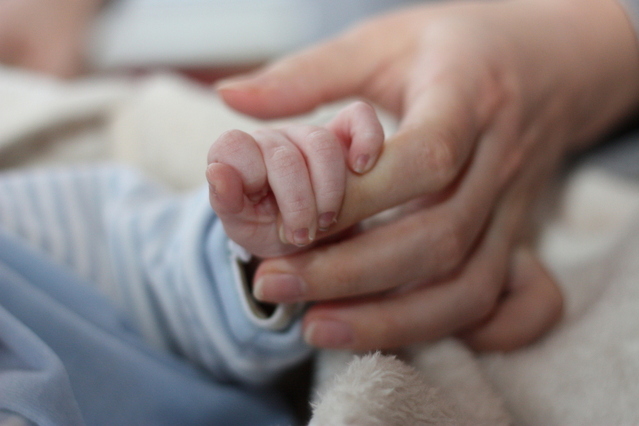Resolute: Responding Well to Life’s Interruptions
Before I had children I heard it said that the hardest part about being a mother was seeing your heart go walking around outside your body. There’s a lot of truth to that. To love someone so much and yet for that little one to be independent and autonomous from you, capable of making their own decisions and mistakes, is something that I know must only get harder as the years pass. But if seeing your heart go walking around outside your body is difficult, perhaps an equally difficult aspect to motherhood is seeing your flaws go walking around outside your body.
At least once a day, I ask my little guy to do something and he refuses to respond right away because he is focused on a task and he must complete it. Perhaps I’ve asked him to come and get his shoes on and he is adamant he will not until his tower is completed. Perhaps I’ve asked him to come to the dinner table and he is adamant that he will not because he is not finished moving all his matchbox cars from their box to the window sill. Now the fact that I get irritated with him over this is ironic because mommy is absolutely hard-wired the same way. I am focused, determined, and resolute. And unfortunately, that can also make me stubborn, oblivious and sometimes impervious to a change in course. They say our greatest strengths are also our greatest weaknesses—double-edged swords wielded correctly they show our prowess, wielded incorrectly they expose our failings. The hard part of my job will be to teach my little guy to master this sword, this one I also so often fall on.
I’ve been thinking of this resolute trait this Lenten season as I think about Jesus moving toward the day of his death and as I continue thinking about what it means to pay attention and be available. Luke’s Gospel records these words for us: “As the time approached for him to be taken up to heaven, Jesus resolutely set out to Jerusalem” (Luke 9:51 NIV, ital. mine). In the NKJV, it says He “set his face toward Jerusalem.” The wording signifies a direct knowledge of what was to come (the cross, his sacrifice) and a direct and resolute turning toward that end point.
I don’t know what it must be like to know your death is imminent. I don’t know what it is like to know that pain beyond what any mind can imagine is just around the corner. I don’t know what it is like to know with certainty that you will face the greatest separation of all: separation from God. But I can only imagine that if I knew with certainty that such events were coming my way, that my mind would not be focused on the needs of others, but preoccupied with my own troubles. And yet Jesus gives us a far different picture.
Immediately after the Scriptures tell us that Jesus set His face toward Jerusalem, it tells us that He sent messengers before Him to Samaria. He knows the cross is coming and yet His mission remains one of mercy…of sharing the Good News with those both far and near. A few chapters later, we see this resolute Jesus weeping over Jerusalem, wishing that He could gather them into His arms like a mother hen (Luke 13:31-35).
As Christ gets closer to the cross, as His own pain intensifies, the Gospel of Luke alone records for us some of the more tender moments of mercy in the midst of His own unimaginable pain. In His hour of gravest need, at a time when no one would blame Him for being completely self-focused, He still continues to minister to those around Him. In Luke 23:27-29, some women are following Jesus on His way to the cross, weeping and wailing for Him. He turns his compassion back on them, however. Luke alone records, Jesus’ famous words from the cross, “Father, forgive them for they do not know what they are doing” (23:34) as well as the conversation between Jesus and the repentant thief on the cross next to Him, whom He comforts with the words, “Truly, I tell you, today you will be with me in paradise” (23:43). Jesus has an eye to minister to others even in the midst of his pain. Though He was focused and resolute, He welcomed opportunities to be “interrupted.” Or perhaps, more accurately, with His focus on the cross, the ultimate act of mercy, He could be free to show mercy along the way.
As focused as I am, I know this is something I need to work on and teach my children about also. If our ultimate goal in life is mercy, we won’t mind being interrupted to show mercy. If our ultimate goals are kingdom goals, we won’t mind being interrupted by kingdom opportunities. But if we are busy building our own kingdoms, busy gratifying our own egos, busy focused on any goal that has lost its ultimate point of giving glory to God, we will be irked at being interrupted.
So whether you are in the midst of something painful in your life or something just mind-consuming, or if you are just a task-oriented person like myself, ask God to give you spiritual eyes today like those of Jesus, to look past your own situation or goals to the needs of others. By His grace, be resolute to be merciful. By His grace, be resolute to put the needs of others before yourself.
How do you do when you are interrupted? Do you respond graciously? When you are in the midst of pain or hardship, do you become myopic–unable to see past your own pain to the needs of others? How does Jesus’ example compel you to be different?








Beautifully written. I found the paragraph on Christ’s thoughts as death was imminent to be incredibly moving. Good stuff!
Thank you, Linda. I’ve found it to be a good exercise as I prepare for Easter to read back through Luke’s passion narrative and see how many times Jesus’ focus is on others in the midst of the most excruciating pain imaginable.So challenging and moving.
Hello. fantastic job. I did not imagine this. This is a fantastic story. Thanks! Materiały arkuszowe